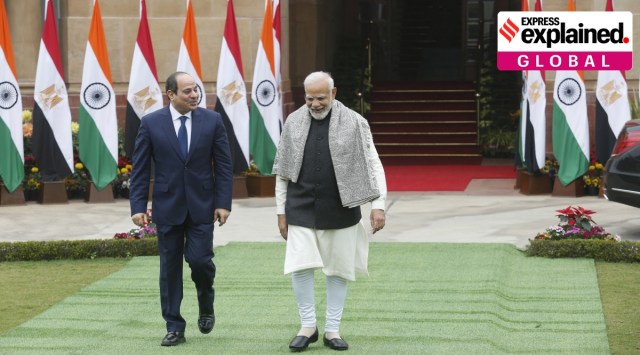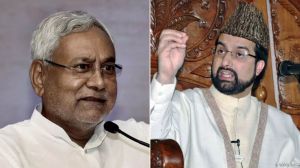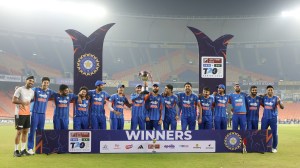Modi’s visit to Egypt: A look back at the relationship between Delhi and Cairo, and where it stands today
The scheduled interaction between PM Modi and Egypt President el-Sisi highlights the growing cooperation between the two countries, especially in recent years. While Delhi seeks to consolidate its position in the Arab world with Cairo’s help, the latter wants India to expand its trade and investments in the country to help deal with its ongoing economic crisis.
 Prime Minister Narendra Modi with Egyptian President Abdel Fattah El-Sisi before meeting at Hyderabad House in New Delhi on January 25, 2023. El-Sisi was the chief guest during this year's Republic Day parade. (Express photo by Anil Sharma)
Prime Minister Narendra Modi with Egyptian President Abdel Fattah El-Sisi before meeting at Hyderabad House in New Delhi on January 25, 2023. El-Sisi was the chief guest during this year's Republic Day parade. (Express photo by Anil Sharma) After wrapping up his first State visit to the United States, Prime Minister Narendra Modi landed in Egypt to kickstart his two-day visit on Saturday evening (June 24). Arriving for the first time in Cairo since he assumed the top job, Modi will be the first Indian PM to embark upon an official bilateral visit to the country since 1997.
During his stay, Modi is slated to interact with the Indian community in Egypt, meet prominent personalities, visit the 11-century Al-Hakim Mosque and hold bilateral talks with Egyptian President Abdel Fattah el-Sisi, who visited India earlier this year as the chief guest for Republic Day celebrations.
As the two leaders meet for the second time within six months, their scheduled interaction highlights the growing cooperation between the two countries, especially in recent years. While Delhi seeks to consolidate its position in the Arab world with Cairo’s help, the latter wants India to expand its trade and investments in the country to help deal with its ongoing economic crisis.
How has the relationship between India and Egypt evolved over the years?
Delhi established a bilateral relationship with Cairo just three days after it got Independence on August 15, 1947. Their partnership, however, began to blossom when India’s first Prime Minister Jawaharlal Nehru and Egypt’s second President Gamal Abdel Nasser became close. The friendship was first tested during the 1956 Suez Canal crisis when Nasser nationalised the canal leading Israel, and later France and Britain, to attack Egypt.
Nehru lost no time in condemning the aggression against Cairo and, as per academic Swapna Kona Nayudu’s article, Nehru’s India & the Suez Canal Crisis of 1956, published by the University of Pennsylvania, “took a number of measures to mediate” between the opposing parties, including asking the US to intervene in the matter,
She wrote: “The US–sponsored Uniting for Peace resolution, passed on November 2, 1956, pushed fighting forces behind armistice lines, and opened the way for what came to be known as the Eisenhower-Nehru formula.” India went on to emphasise the urgent need to decolonise Asia and Africa in the United Nations, “contributing substantially to the closing of the crisis,” Nayudu added.
In the following years, the bond between Nehru and Nasser further solidified. The two charismatic leaders, ardent supporters of the liberal and decolonisation movements, played a pivotal role in founding the Non-Aligned Movement (NAM) along with Yugoslavia’s President Josip Broz Tito, Indonesia’s President Sukarno and Ghana’s President Kwame Nkrumah. It was because of this special relationship that India also stood firmly next to Egypt and the Arab world when they came to blows with Israel over Palestine — Delhi didn’t establish full diplomatic relations with Tel Aviv until 1992.
Notably, Delhi and Cairo didn’t just focus on political strategies. The two nations seek to strengthen their defence and economic ties too. For instance, as per the Ministry of External Affairs, “there was close cooperation between the two nations’ Air Forces, with efforts at jointly developing a fighter aircraft in the 1960s.”
But what once used to be a cornerstone of its foreign policy, India put its partnership with Egypt on the back burner in later years, particularly during the 1970s. In a column for The Indian Express, C Raja Mohan, a senior fellow at the Asian Policy Institute in Delhi, wrote: “The Indian foreign policy discourse, with its deepening anti-Western rhetoric and empathy for radical Arab States in the 1970s, was not empathetic to the concerns and interests of Egypt as it made brave moves to rethink its regional policies.”
Those years saw India completely ignoring not just Egypt but also the whole West Asia region. By the end of the Cold War, the area had completely dropped off Delhi’s agenda — India had only maintained relations on “a mercantilist basis” with oil-producing nations and those countries where Indian labourers migrated for work, Raja Mohan told Centre for Strategic and International Studies in an interview.
Why have India and Egypt rekindled their ties with each other?
The Modi years, however, have witnessed a turnaround in the situation. Since 2014, India has sought to engage with West Asian countries. The reasons, as Raja Mohan explained in the interview, for doing so are quite clear: Delhi wants to draw huge amounts of capital from Gulf nations, curtail religious extremism by supporting moderate countries in the region while encouraging social reforms, and participate in the security politics of the area.
And in order to do all this, India has realised that Egypt is a key player. The country has remained fairly moderate over the years, shares strong ties with the UAE and Saudi Arabia (both nations have made heavy investments in Egypt), and is located at a crucial geo-strategic location — 12 per cent of global trade passes through the Suez Canal. Therefore, the bilateral relations between Delhi and Cairo have once again taken centre stage.
Meanwhile, Cairo wants India’s help to tackle its battered economy. The outbreak of the COVID-19 pandemic coupled with the implications of the Russia and Ukraine war has worsened its financial woes. Inflation in the country is at a five-year high of over 30 per cent and it has approached the International Monetary Fund (IMF) for the fourth time in six years for a bailout.
According to a report by The Indian Express, Egypt has “sought investments in infrastructure — Metro projects in Cairo and Alexandria, a Suez Canal economic zone, a second channel of the Suez Canal, and a new administrative capital in a Cairo suburb. More than 50 Indian companies have invested more than $3.15 billion in Egypt” from Delhi.
When el-Sisi arrived in India earlier this year, the two countries announced that they had decided to elevate their bilateral relationship to a “strategic partnership”. The strategic partnership is supposed to comprise four key elements, including scientific and academic collaboration; cultural and people-to-people contacts. As Modi lands in Cairo on Saturday, it’s expected the two leaders will work further towards deepening the ties between the two countries.
- 01
- 02
- 03
- 04
- 05






































